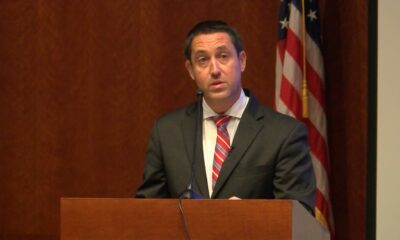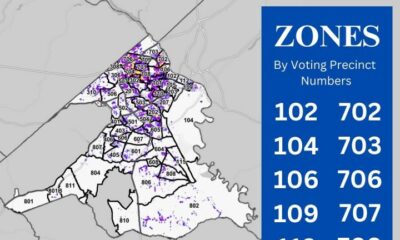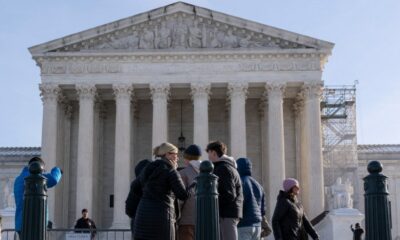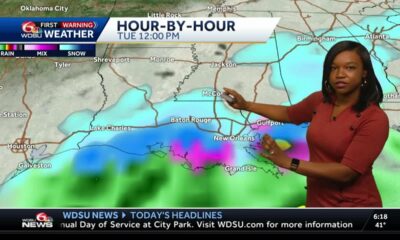News from the South - North Carolina News Feed
U.S. Senate GOP blocks lifeline for TikTok, though CEO will sit with Trump at inaugural • NC Newsline
SUMMARY: Senate Minority Leader Chuck Schumer criticized Republicans for blocking a bill to extend the deadline for TikTok’s parent company, ByteDance, to sell the app or face a ban in the U.S. by Sunday. With around 170 million American users, Schumer argued more time was essential to prevent disruption to influencers reliant on the platform. GOP Senators Tom Cotton and Pete Ricketts opposed the extension, citing long-standing warnings about the national security risks posed by the app. Meanwhile, TikTok’s CEO will attend President-elect Trump’s inauguration as the company appeals to the Supreme Court regarding the law requiring a sale.
The post U.S. Senate GOP blocks lifeline for TikTok, though CEO will sit with Trump at inaugural • NC Newsline appeared first on ncnewsline.com
News from the South - North Carolina News Feed
Why do taxes and mortgages have to be paid on destroyed properties? Why aren’t students making up lost time from Helene? Tree cutting on I-40? • Asheville Watchdog
Question: Why do property taxes and mortgages for Buncombe County homes and residences destroyed by Hurricane Helene, and which no longer exist, have to continue to be paid?
My answer: Ben Franklin pretty much summed this up when he said, “Nothing is certain except death and taxes.” Brilliant man, except for that stint flying a kite in an electrical storm. Seems like there had to be an easier way to learn about electricity.
Real answer: This question is a fair one to ask, in my opinion, as I’ve talked with a few people who are paying mortgages on properties that aren’t there or were heavily damaged.
But as with just about everything in life, it gets more complicated than you might think.
Buncombe County spokesperson Kassi Day said the county has gotten “lots of questions surrounding the delinquency date for 2024 tax bills. Tax bills that became delinquent on Jan. 6 were 2024 tax bills for property values as of Jan. 1, 2024,” Day said via email.
“Those bills were due in early September and became delinquent on Jan. 6,” Day said. “North Carolina law does not allow any county to extend the date payments are due, or stop, adjust, or postpone the date interest starts to accrue on bills deemed past due.”
Day said the county understands this “might be frustrating and complicated and our team wanted to make sure people knew about payment arrangements that might be available.
“North Carolina state law also prohibits any county from having any flexibility to waive or prorate taxes — even after a natural disaster,” Day said. “However, property that is damaged due to Helene and still damaged as of Jan. 1, 2025, will see a reduction in 2025’s taxable value. Our assessment team is working hard to survey damaged areas so values can be updated to reflect the current situation.”

Day said the county has been encouraging residents to report damaged property on the county web page dedicated to property damage.
Day also cited a recent UNC-Chapel Hill School of Government blog by Chris McLaughlin that notes, “Damage to property that occurs after January 1 will be reflected in the taxable value of that property for the following year’s taxes. Buildings that remain damaged or destroyed as of January 1, 2025 will be reappraised and taxed at a lower value (or zero value) for 2025-26 taxes.”
Regarding mortgages, that’s not a county function but one of banks, mortgage lenders and the federally backed mortgage system known as Freddie Mac and Fannie Mae. These are government-backed entities that buy mortgages from lenders, then package them into securities for investors.
USA.gov has a page on mortgage help and home repairs after a disaster that states, “You must continue to pay your mortgage, even if a disaster damages your home. Contact your mortgage servicer if you are unable to pay. Ask your servicer if you qualify for mortgage forbearance.”
Forbearance, according to the Consumer Financial Protection Bureau, “is a process that can help if you’re struggling to pay your mortgage. Your servicer or lender arranges for you to temporarily pause mortgage payments or make smaller payments. You still owe the full amount, and you pay back the difference later.”
I scoured several other online sources and spoke with a local mortgage broker about this, and the upshot is: your mortgage is a legally binding contract for you to repay a loan. Basically, you are on the hook for that money.
If hundreds or thousands or tens of thousands of borrowers decided to stop paying their mortgages on destroyed homes, that would have a cascading effect on banks and ultimately Freddie Mac and Fannie Mae. That could lead to the banks or federal lending institutions becoming insolvent, which is similar to what happened leading up to the Great Recession of 2008-09 when hundreds of thousands of homeowners realized they owed way more than their homes were worth and just walked away from their debts.

I can see where it certainly feels unfair to have to continue paying on a home that’s destroyed, but as the mortgage broker told me, if you borrowed for a new car and it got totaled and your insurance was inadequate, you’d be on the hook for that, too.
It’s also worth noting that FEMA does offer the Hazard Mitigation Program, administered by the state of North Carolina, that can buy your damaged home outright, or pay to have it elevated or rebuilt at a higher level. I wrote about this in November when FEMA announced the plan locally.
I’m also hopeful that among the hundreds of millions of dollars flowing into our community that some of it will be earmarked to help homeowners who are caught in this situation. In the meantime, keep in mind that not paying your mortgage can lead to a badly damaged credit rating and could have negative long-term financial ramifications.
Question: I just found out that the decision was made not to make up the time kids missed school due to Helene. Can you please explain what was the rationale for that? I understand that they don’t have to make up the time if it is less than 20 days. I would have thought educators would want to make up the time.
My answer: I mean, who doesn’t want to work more?
Real answer: The missed time will not be made up, as the reader noted.
“Unfortunately, we cannot make the days up,” Kimberly Dechant, chief of staff with Asheville City Schools, told me via email. “The General Assembly voted to forgive the days missed due to Hurricane Helene in the first Hurricane Relief Bill passed by the North Carolina General Assembly, as well as pay all staff during that time.”
Dechant noted that 10-month employees can only work and be paid for 215 days.
In a recent letter sent to school families and staff, Asheville City Schools noted that North Carolina law requires that the school year start no earlier than the Monday closest to Aug. 26 and end no later than the Friday closest to June 11. The state also requires systems to observe at least 11 holidays.
Also, the state requires a minimum of 1,025 Instructional hours, or 185 days. Under a normal calendar year, ACS exceeds this, with 1,094.4 hours at the elementary level and 1,170 hours at the secondary level.
The letter also noted that state law typically allows for up to five virtual learning days during inclement weather.
“However, in response to Hurricane Helene during the 2024-2025 school year, House Bill 149 granted an additional 30 remote instruction days or 180 remote instruction hours to affected districts,” the letter states. “These days are in addition to the forgiven instructional days missed in September and October.”
Buncombe County Schools, at its Oct. 18 school board meeting, also discussed the lost time issue and cited the state law and its requirements in similar calendar decisions.
Question: Any idea why NCDOT has decided to start doing tree removal on 40 (between exits 50-59) in the last week? It doesn’t look like “urgent” removal (not blocking the roads at all), but has caused major slowdowns in the afternoon in each direction as they block off a lane each time. Y’know, we really need more traffic on our roads that are open right now — especially from about 3-5pm.
My answer: I detect some serious snark near the end of this question. That’s my territory, bub!
Real answer: “The tree debris removal work on I-40 between exits 50-59 is part of the Hurricane Helene cleanup effort,” Chris Medlin, district engineer with the NCDOT’s Asheville office, said via email. “The tree removal process requires workers to load tree debris material within five feet of an open travel lane. Per NCDOT policy, that requires closing the adjacent travel lane for the safety of workers and drivers.”
The good news is this work, which began in early November, should wrap up by the end of January, Medlin said.
Asheville Watchdog is a nonprofit news team producing stories that matter to Asheville and Buncombe County. Got a question? Send it to John Boyle at jboyle@avlwatchdog.org or 828-337-0941. His Answer Man columns appear each Tuesday and Friday. The Watchdog’s reporting is made possible by donations from the community. To show your support for this vital public service go to avlwatchdog.org/support-our-publication/.
Related
The post Why do taxes and mortgages have to be paid on destroyed properties? Why aren’t students making up lost time from Helene? Tree cutting on I-40? • Asheville Watchdog appeared first on avlwatchdog.org
News from the South - North Carolina News Feed
A defeated Republican candidate is exploiting ‘an administrative hiccup’ to erase the ballots of 1,576 Buncombe County voters
The ballots cast by 1,576 Buncombe County voters in the Nov. 5 election could be nullified if Republican state Supreme Court candidate Jefferson Griffin succeeds in challenging his razor-thin loss to incumbent Associate Justice Allison Riggs, a Democrat.
The Buncombe County ballots make up a small fraction of the 60,000 ballots cast by voters across North Carolina that Griffin seeks to erase from the 5.5 million votes counted in that race. His goal is to flip the results by persuading the Republican-dominated state Supreme Court to call for a recount of the balloting minus those targeted voters, or to order a new election.
According to numerous analyses of the targeted voters, a lawsuit filed by Griffin could disqualify a disproportionate number of voters who historically favor Democratic candidates, especially those age 25 and younger.
The lawsuit also disproportionately targets Buncombe County’s Democratic voters by disqualifying the ballots of three times as many registered Democrats as registered Republicans. That impact goes beyond the Democratic Party’s long-existing, though narrower, edge over Republicans in the county.
Griffin’s lawsuit does not identify a single fraudulent ballot among the 60,000 he’s contesting, a point emphasized by opponents and contrary to the basis for most disputed elections.
Instead, the Republican’s challenge alleges that clerical flaws on the targeted voters’ registration records are sufficient to disqualify the ballots despite the fact that the voters played no role in these alleged mistakes.
“This is norm breaking,” said Western Carolina University professor Chris Cooper, an expert on North Carolina elections. “Calling for recounts in close elections is normal. But this is much different.
“Norm-breaking doesn’t begin to describe this.”
Several Buncombe County voters targeted in the lawsuit responded with a mix of confusion about how they allegedly violated election law, and anger over the prospect of having their votes nullified.
“I don’t think there could be anything I did that would make my ballot illegitimate,” said Esther Holsen of West Asheville, a North Carolina resident since 1992 who has been voting since 1976.
“But I’m not so much shocked as I am annoyed because, at this point, just about anything can happen in politics,” said Holsen, a Democrat.
John Nicolay, a self-described independent voter who said he prefers to choose candidates based on merit rather than party affiliation, told The Watchdog that he is beyond annoyed.

“If my ballot is tossed, I will have a big problem [with being targeted] because someone just negated my right to vote,” he said. “Forget what party you’re in, I don’t buy that.”
Anthony Turco and his wife Sally Turco, Republicans who live in Weaverville, learned they were on the targeted list when Anthony was contacted by The Watchdog. He said the couple registered to vote together at the county elections department in 2011 and provided all the information requested and showed proper photo identification when they participated in early voting.
“I don’t have any idea about what this could be about,” Turco said.
Of the more than 5.5 million ballots cast in the state Supreme Court race, Riggs prevailed by 734 votes. Despite two recounts and reviews by a county and the state Board of Elections, Griffin failed to close the gap.
But he refused to concede defeat, choosing instead to file the lawsuit seeking a court-ordered recount of the reshaped electorate minus the targeted voters or – in a hail-Mary move – persuading the state Supreme Court to call a new special election.
In both cases, Griffin’s goal is to reverse the election outcome and boot Riggs from the Supreme Court. The Court accepted jurisdiction in the case and held a preliminary hearing earlier this month, putting itself in the unprecedented position of interfering in a campaign to choose a colleague.
Five of the Supreme Court’s seven members are Republicans and, because Riggs has recused herself from the case, the Republicans will hold a 5-1 majority when considering Griffin’s challenge.
The case has drawn the attention of critics across the country, including Democrats who say Riggs could be the victim of judicial gerrymandering. The mantra “stop the steal” is being applied by Riggs supporters in a twist of that phrase coinedby Donald Trump supporters after he lost the 2020 presidential election.
At the core of the criticism is Griffin’s mass targeting of more than 60,000 voters based on these voters’ alleged failures to record driver’s license or Social Security numbers on their electronic registrations. Griffin also targeted only those voters who participated in early voting, apparently because their ballots could be readily obtained and cross-tabulated against the other criteria.
Complicating the case is the fact that if Griffin’s lawsuit succeeds, it will also impact other state and county races in which the targeted voters cast ballots, possibly reversing the result in some.
Cooper, the political analyst, said the prospect of creating cascading chaos in countless other races to satisfy Griffin may prove too daunting for even a Republican majority on the Court.
A more likely outcome, he said, would be for the Supreme Court to throw out the entire results of the Griffin-Riggs race and order a special election.
“The court might say, ‘We can’t simply take away these people’s ballots when some of them may have done the right thing,’ but,” Cooper continued, “there was an administrative hiccup somewhere, so therefore they’ll call for a brand new election.”
The Griffin campaign didn’t respond to written questions from The Watchdog seeking an explanation for the mass-targeting tactic and whether Griffin had concerns about a voter backlash. Matt Mercer, the state GOP’s communications director, has defended the tactic saying that discrepancies in the voter data files were brought to the state Board of Elections’ attention two years ago and no action was taken.
Whether the campaign developed an algorithm to target voters more likely to back the Democratic candidate still remains a puzzle for election analysts. Among the 60,000 challenged voters are many registered in both major parties, as well as those independents registered as unaffiliated.
But deliberate or not, there is evidence that the targeted group leans more toward Democratic candidates than the state’s electorate as a whole. An analysis by the Raleigh News & Observer found that voters between ages 18 and 25 are disproportionately included.
These young voters make up 23 percent of the challenged group, although they are just 12 percent of the electorate. Cooper said this group historically favors Democrats over Republicans.
A Watchdog analysis of the 1,576 Buncombe County voters found that Democrats outnumbered Republicans in the targeted group by a ratio of nearly three to one, although Democrats’ edge is just three to two among all Buncombe County voters.
With rare exceptions, these voters shared the fact that they cast their ballots in person during the early voting period, and their original county voter-registration record lacked driver’s license numbers.
The law, which took effect in 2004, doesn’t require a voter to have a driver’s license and allows several alternative forms of identification such as government-issued IDs, passports and birth certificates. A new state law that took effect in 2024 requires a voter to show an authorized ID when casting a ballot during in-person voting.
Cooper said he doubts the Griffin campaign developed an algorithm to scan the 2024 ballots with the intention of cherry-picking those most likely cast for his opponent and increasing his chances of reversing the outcome. Rather they saw the records’ discrepancies as a way to legitimize a lawsuit.
“Griffin needed to find a legal horse he could ride to get into court,” Cooper said. “It’s as simple as that.”
Asheville Watchdog is a nonprofit news team producing stories that matter to Asheville and Buncombe County. Tom Fiedler is a Pulitzer Prize-winning political reporter and dean emeritus from Boston University who lives in Asheville. Email him at tfiedler@avlwatchdog.org. The Watchdog’s reporting is made possible by donations from the community. To show your support for this vital public service go to avlwatchdog.org/support-our-publication/.
Related
The post A defeated Republican candidate is exploiting ‘an administrative hiccup’ to erase the ballots of 1,576 Buncombe County voters appeared first on avlwatchdog.org
News from the South - North Carolina News Feed
AMERICANS Act would reinstate 8,400 armed forces | North Carolina
SUMMARY: North Carolina Rep. Pat Harrigan, a Green Beret veteran, and Texas Sen. Ted Cruz have introduced the AMERICANS Act to counter Biden administration military policies regarding COVID-19 vaccinations. The legislation aims to reinstate 8,400 discharged service members, restore their benefits, and prevent future mandates from being used against the armed forces. Harrigan criticized the vaccine mandate as political overreach that stripped patriots of their careers and dignity. Cruz emphasized the ongoing impact of vaccine mandates on military readiness and stated that the act provides remedies for servicemembers punished for their convictions, highlighting a commitment to honor and integrity in the military.
The post AMERICANS Act would reinstate 8,400 armed forces | North Carolina appeared first on www.thecentersquare.com
-

 The Conversation3 days ago
The Conversation3 days agoVaccine hesitancy among pet owners is growing – a public health expert explains why that matters
-

 News from the South - South Carolina News Feed5 days ago
News from the South - South Carolina News Feed5 days ago24 dead as fire crews try to corral Los Angeles blazes before winds return this week
-

 News from the South - Georgia News Feed6 days ago
News from the South - Georgia News Feed6 days agoMAP: Emergency room visits for respiratory illnesses are soaring in these states
-

 News from the South - Georgia News Feed5 days ago
News from the South - Georgia News Feed5 days ago16 dead, 16 missing as fire crews try to corral Los Angeles blazes before winds return this week
-

 News from the South - Texas News Feed5 days ago
News from the South - Texas News Feed5 days agoSurplus could fuel ‘life-changing decisions’ for Texans
-

 News from the South - Florida News Feed5 days ago
News from the South - Florida News Feed5 days agoAsian stocks follow Wall Street’s retreat, oil prices surge
-

 News from the South - Florida News Feed2 days ago
News from the South - Florida News Feed2 days agoSpeaker Johnson removes chair of powerful House Intelligence Committee
-

 News from the South - Florida News Feed4 days ago
News from the South - Florida News Feed4 days agoMother of Jacksonville teen killed hours after high school graduation aims to keep his memory alive with special event




























